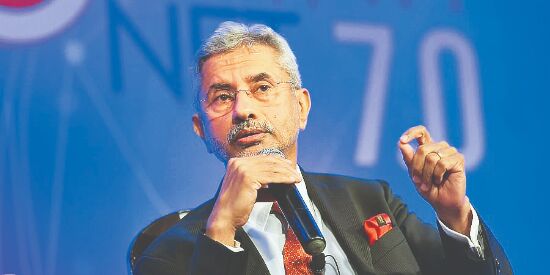'Edge' of warfare in Af will be deeply felt, if left unattended'

New Delhi: India on Tuesday warned that the "edge" of the warfare in Afghanistan, if left unattended, will be deeply felt not just in that country's neighbourhood but well beyond, and emphasised that legitimacy cannot be derived from mass violence, brutal intimidation or covert agendas,
In an address at the inaugural session of BRICS academic forum, External Affairs Minister S Jaishankar also said that the warfare in Afghanistan has "sharpened the challenge" of terrorism and therefore, all stakeholders are in the quest for a clear, coordinated
and undifferentiated response to terrorism.
In his virtual address, he said structural inertia, competitive gridlocks, uneven resourcing and skewed navigation have disadvantaged the multilateral institutions, resulting in certain "gaps".
"Terrorism thrives in some of these gaps. Its nursery lies in conflict-ridden spaces made fertile for radicalisation by malign players, including states. The transition in Afghanistan that we are seeing today and the warfare that has yet again been forced upon its people has sharpened this challenge. Left unattended, its edge will be deeply felt not just in Afghanistan's neighbourhood but well beyond," the minister said.
"We are therefore all stakeholders in the quest for a clear, coordinated and undifferentiated response to terrorism. In the 21st century, legitimacy cannot be derived from mass violence, brutal intimidation or covert agendas. Representation, inclusion, peace and stability are inextricably linked," he added.
The Taliban has been making rapid advances across Afghanistan by resorting to widespread violence since the US began withdrawing its troops on May 1. The US has already pulled back the majority of its forces and is looking to complete the drawdown by August 31.
Jaishankar also called for reform of the multilateral institutions saying an "updating and recalibration" of the post-World War II multilateral architecture cannot be postponed any further.
The pandemic and the normative breakdown in its wake have "rudely" reminded us that institutions built to tackle problems of the 1940s desperately need to be upgraded and made fit-for-purpose for our century, he said. He said an expansion of the permanent membership of the UN Security Council is a necessary ingredient but by itself, it is not sufficient.
"Multilateral institutions have been disadvantaged by structural inertia, competitive gridlocks, uneven resourcing and skewed navigation. The proliferation of new and smaller platforms, including of plurilateral and regional groups, is, therefore, a response to such felt gaps," he said.



